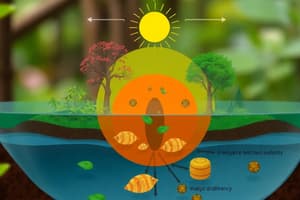Podcast
Questions and Answers
Which of the following correctly describes producers within an ecosystem?
Which of the following correctly describes producers within an ecosystem?
- Organisms that create their own food. (correct)
- Organisms that break down dead material for nutrients.
- Organisms that obtain energy by consuming other organisms.
- Organisms that rely solely on carnivorous diets.
Which interaction is characterized by one species benefiting while the other is harmed?
Which interaction is characterized by one species benefiting while the other is harmed?
- Commensalism
- Mutualism
- Competition
- Predation (correct)
In an ecosystem, what is the primary role of decomposers?
In an ecosystem, what is the primary role of decomposers?
- To produce food through photosynthesis.
- To consume only herbivores.
- To break down dead organisms and recycle nutrients. (correct)
- To compete with other producers for sunlight.
What is an example of mutualism in an ecosystem?
What is an example of mutualism in an ecosystem?
Which factors are considered abiotic components of an ecosystem?
Which factors are considered abiotic components of an ecosystem?
Flashcards
What is an Ecosystem?
What is an Ecosystem?
A system where living organisms (plants, animals, microbes) interact with each other and their non-living environment, creating a balanced and interconnected network.
Biotic Components
Biotic Components
Living parts of an ecosystem. Includes producers, consumers (herbivores, carnivores, omnivores), and decomposers. They are all connected through food chains and webs.
Abiotic Components
Abiotic Components
Non-living parts of an ecosystem such as rocks, sunlight, water, and air. They provide the physical conditions for life.
What is Predation?
What is Predation?
Signup and view all the flashcards
What is Competition?
What is Competition?
Signup and view all the flashcards
Study Notes
Ecosystem Definition
- An ecosystem is a community of living organisms (plants, animals, and microbes) interacting with each other and their physical environment (air, water, soil)
Components of an Ecosystem
- Biotic: Living organisms (e.g., bears, fish, plants)
- Abiotic: Non-living components (e.g., rocks, sun, water)
Trophic Levels
- Producers (plants): Make their own food
- Consumers: Eat other organisms
- Herbivores: Eat only plants
- Omnivores: Eat both plants and animals
- Carnivores: Eat only animals
- Detritivores/Decomposers: Break down dead organisms
- Food Chain: Shows the flow of energy through the ecosystem.
Interactions within an Ecosystem
- Predation: When one animal hunts, kills, and eats another
- Competition: When organisms compete for resources (e.g., food, water, shelter)
- Mutualism: When both species benefit from the interaction (e.g., bees and flowers)
- Commensalism: When one species benefits and the other is neither harmed nor helped (e.g., barnacles on whales)
- Parasitism: When one species benefits and the other is harmed (e.g., mosquitoes and humans)
Other concepts
- Ecosystem stability: The ability of an ecosystem to maintain balance over time.
- Species: A group of organisms that can reproduce and produce fertile offspring.
Studying That Suits You
Use AI to generate personalized quizzes and flashcards to suit your learning preferences.




